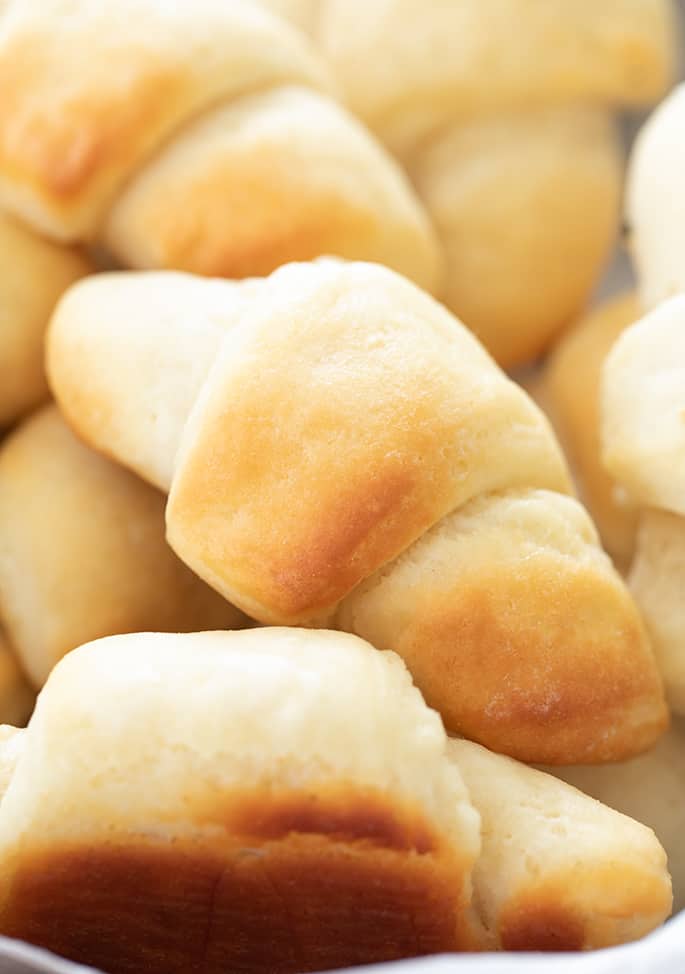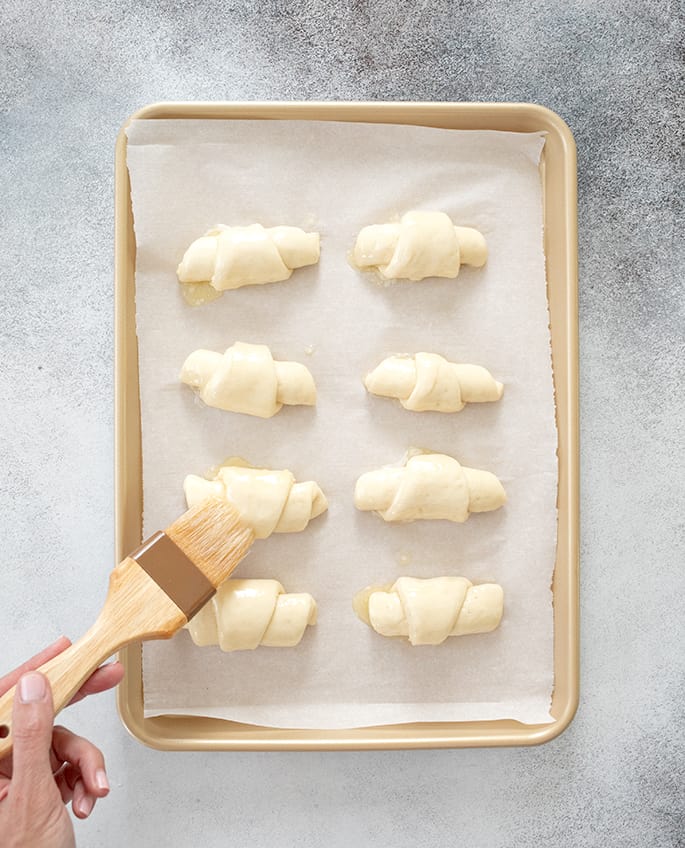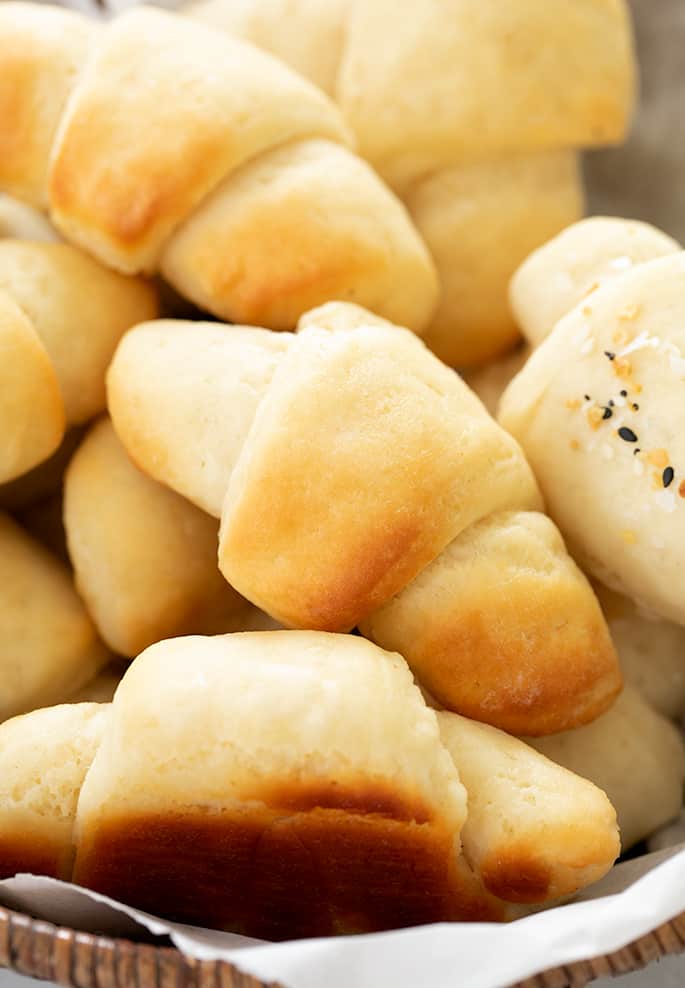

These soft, intensely buttery gluten free crescent rolls are just as flaky and soft as the ready-made kind from the grocery store. And the dough is just as useful!

WANT TO SAVE THIS RECIPE?
What makes this recipe for gluten free crescent rolls so special?
I assume you already know about the crescent rolls in the refrigerated section of nearly every grocery store in nearly every town in America. And if you haven't been gluten free your whole life, you've probably already bought that dough and used it in a bunch of interesting and fun ways.
Well, with this gluten free crescent roll dough, you can have all those recipes back along with the classic basket of buttery rolls that makes any dinner instantly better.
The dough will keep in the refrigerator, as long as it's in a tightly sealed container, for a few days. Bake the rolls on the same day you plan to serve them, preferably warm, though. Bread is always best the same day it's baked.

FAQs
No, crescent rolls are typically made with wheat flour, which is one of the main gluten-containing grains.
No, crescent rolls are not the same as croissants. They are similar in shape, but a crescent roll is bread, and a croissant is pastry. Croissants are like a cross between crescent rolls and flaky layered buttermilk biscuits.
You can, indeed, make gluten free croissants (we've done it!). But you'll need to work with the dough as if it were pastry, using cold ingredients and rolling and folding the dough to create light, flaky layers.
Crescent rolls are traditionally made with wheat flour, so celiacs should not eat them. This recipe, however, is developed to be made with a gluten free flour blend and all other gluten free ingredients, so it's safe for celiacs.
No, Pillsbury crescent rolls are made with enriched bleached wheat flour, which is not gluten free. Avoid these rolls on a gluten free diet.
Yes! This crescent roll dough can be used in any way you might have used Pillsbury crescent roll dough.
No, Annie's brand crescent rolls are made with wheat flour, so they aren't gluten free. Annie's does make certain gluten free products, like gluten free mac and cheese, but be careful to only buy their products that are clearly marked “gluten free,” and always read labels!
Yes, these rolls can be baked, cooled, and then frozen. You could also try parbaking the ones that you plan to freeze. Just bake them at about 300°F until they are just set but not browned at all (about 8 minutes).
Let them cool, then freeze in a single layer before piling them into a sealed freezer-safe container. When you’re ready to bake them, preheat the oven to 350°F, let them defrost almost fully at room temperature, then bake until just browned (about 10 minutes). Fresh rolls!

Serving suggestions for using this soft, buttery bread gluten free crescent roll dough
Have you ever bought a metal can of Pillsbury crescent rolls and used it to make something other than straight-up crescent rolls? In any way you may have used that dough, you can use this gluten free crescent rolls dough.
1. Ham and cheese sandwiches
Try making larger triangles by slicing each round into 6 or 8 pieces rather than 12. Then add a slice of ham and a slice of cheese to the top of the triangle before rolling it from base to tip.
Space the triangles farther apart from one another on the baking sheet. The cheese will melt onto the baking tray a bit. Just let it set a few moments after baking and before serving.
2. Cinnamon sugar rolls
Mix 1 teaspoon ground cinnamon with 1/4 cup (50 g) granulated sugar with 1 teaspoon cornstarch in a small bowl. After brushing the triangles with melted butter, sprinkle with a thin layer of the cinnamon sugar mixture.
Press the cinnamon sugar mixture down a bit to help it adhere to the melted butter on the dough. Roll from base to tip, and continue with the recipe as written.

Gluten free crescent rolls: Ingredients and substitution suggestions
This recipe can't be made into gluten free dairy free crescent rolls
You can try replacing the yogurt and butter in this recipe, but the gluten free bread flour blend necessarily calls for whey protein isolate, which is nearly pure milk protein. There is no substitute for whey protein isolate that will produce the same results.
Gluten free egg free crescent rolls
There is only one egg in this recipe, so you may be able to replace it with a “chia egg” (1 tablespoon ground white chia seeds + 1 tablespoon lukewarm water, mixed and allowed to gel).
The egg yolk also adds richness, so you might want to add another tablespoon of butter to the dough and reduce the yogurt by 1 tablespoon to compensate for the added moisture.
About the yeast in these gf crescent rolls
There is no substitute for yeast in a yeast bread recipe. I do have a recipe for yeast free dinner rolls here on the blog, if you can't have yeast.
If you don't have instant yeast, as called for in the recipe, you can use 25% more active dry yeast. See the recipe notes for instructions on how to make the conversion.
The best gluten free crescent rolls recipe
Gluten Free Crescent Rolls | Super Soft & Buttery
Equipment
- 1 2 liter proofing bucket or other sealed container
Ingredients
For the starter
- 1 ¼ cups (175 g) gluten free bread flour blend (see Notes, and click thru for details on this specific blend, which must be used)
- 1 tablespoon (12 g) granulated sugar
- 1 ⅔ teaspoons (5 g) instant yeast (see Recipe Notes)
- 1 cup (8 ounces) warm water (about 95°F)
For the dough
- 3 ½ cups (490 g) gluten free bread flour blend (see Notes, and click thru for details on this specific blend, which must be used), plus more for sprinkling
- 1 tablespoon (18 g) kosher salt
- 1 ½ teaspoons (11 g) honey
- ¾ cup (6 fluid ounces) buttermilk or plain whole milk yogurt at room temperature
- 1 (50 g (weighed out of shell)) egg at room temperature
- 3 tablespoons (42 g) unsalted butter at room temperature
- Risen Starter
- 4 tablespoons (28 g) unsalted butter melted (for brushing)
Instructions
Make the starter.
- In a medium-size bowl, place the bread flour, granulated sugar, and instant yeast, and whisk to combine well. Add the warm water, and mix until smooth and well-combined.
- The mixture will be thick and shapeless. Cover and set the bowl aside in a warm, draft-free location to rise until doubled in size (about 45 minutes).
Make the dough.
- In the bowl of a stand mixer, place the flour and salt, and whisk to combine well with a separate handheld whisk.
- Add the honey, yogurt or buttermilk, egg, room temperature butter, and risen starter to the bowl, and mix to combine.
- Place the bowl in your stand mixer fitted with the dough hook and knead for about 5 minutes on medium-high speed or until the dough is smooth and stretchy, and appears to have lightened a bit in color.
- Spray a silicone spatula with cooking oil spray, and scrape down the sides of the bowl. Transfer the dough to a lightly oiled bowl or proofing bucket large enough for the dough to rise to double its size, and cover tightly with oiled plastic wrap or the oiled top of your proofing bucket.
- Place the dough in the refrigerator for at least 2 hours and up to 5 days.
Shape the rolls.
- On baking day, line a rimmed baking sheet with unbleached parchment paper and set it aside.
- Turn the dough out onto a lightly floured surface, sprinkle it very lightly with more flour. Handling the dough very gently so you don’t incorporate too much flour into the dough, turn the dough over a few times until it’s smoother.
- Divide the dough into two equal portions. Set one aside and cover so it doesn’t dry out.
- Working with the remaining piece of dough, roll it into a 10-inch circle, turning the dough over frequently, sprinkling very lightly with more flour as necessary, and moving it around to prevent sticking.
- With a pizza wheel or sharp knife, slice the round of dough into 4 equal pieces, each a very wide triangle. Slice each quarter into thirds, making twelve triangles total.
- Brush the dough liberally with 2 tablespoons melted butter, then allow the dough to sit briefly to allow the butter to set.
- Repeat with the second half of the dough.
- Once the butter has begun to set, separate one triangle from the circle, and roll it gently but securely from base to tip. Place the shaped crescent roll on the prepared baking sheet, with the tip of the triangle secured on the bottom.
- Repeat with the remaining 11 triangles, spacing the rolls about 2 inches apart on the prepared baking sheet.
Let the rolls rise.
- Cover the baking sheet with lightly oiled plastic wrap, and place it in a draft-free location to rise until about 150% of its original size (30 to 45 minutes). Do not overproof.
Bake the rolls.
- About 15 minutes before the end of the rolls’ rise, preheat your oven to 350°F.
- Once the rolls have finished rising, remove the plastic wrap and brush the tops generously with more melted butter.
- Place the baking sheets in the center of the preheated oven and bake until the rolls are just browned (about 15 minutes). Remove from the oven, and serve warm.
Notes
- 475 grams Better Batter original blend all purpose gluten free flour or my mock Better Batter
- 119 grams whey protein isolate
- 71 grams Expandex modified tapioca starch
WANT TO SAVE THIS RECIPE?

Thanks for stopping by!
Hi, I’m Nicole. I create gluten free recipes that really work and taste as good as you remember. No more making separate meals when someone is GF, or buying packaged foods that aren’t good enough to justify the price. At Gluten Free on a Shoestring, “good, for gluten free” just isn’t good enough! Come visit my bio!


Jennifer says
Hi! I don’t have a stand mixer. Can I knead this dough by hand? Thanks!
Nicole Hunn says
You definitely cannot knead it by hand. This dough requires dough hooks, for sure. If you don’t have a stand mixer, you can use a handheld mixer with dough hook attachments.
Kathleen Armstrong says
do you let the dough rise and double before you put in the fridge or do you let it rise in the fridge?
Nicole Hunn says
The first rise is in the refrigerator, Kathleen. I try to be very, very precise in the instructions, and would never not mention it if I expected you to let it rise first. I promise!
Michelle Stigler says
I made these last night and they are the first GF bread that I have made that turned out and I am SO excited! I did need a quick clarification in the instructions though…do you let the dough rise and double before you put in the fridge or do you let it rise in the fridge. I put it in the fridge to chill after mixing, but was wondering if I missed a step. Also, I used Cup4Cup flour and they turned out great! This was my trial run before Thanksgiving!
Barb says
Thanks so much. It’s time to use all the ingredients I’ve acquired during COVID.
Barb says
Can you recommend any other whey isolate aside from opportuniteas as its $95 per pound on Amazon Canada. Will any unflavored GF whey isolate work for bread flour? Thanks.
Nicole Hunn says
Whoa, Barb, that’s crazy! As long as the product is unflavored whey protein isolate, not concentrate, so around about 90% or more of each gram is milk protein, it will work fine.
JM says
Yesterday, I made your puff pastry as a test before Thanksgiving. I wasn’t expecting it to work and thought I’d have to experiment/practice a lot to get it right. I used Pamela’s all purpose flour. I made 1 crescent roll, 2 cheese straws and 1 patty shell, just to see if it would be edible. I froze the rest of the dough. All 3 items were fantastic on the first try. I’ll have to try this recipe for crescent rolls, but I thought just cutting the puff pastry dough into a triangle and rolling it up made for a treat indistinguishable from a regular crescent roll. Thank you so much for the work you do.
Naomi says
Can you freeze these once made?
Thanks!
Nicole Hunn says
You most definitely can, Naomi! You could also try parbaking the ones that you plan to freeze. Just bake them at about 300°F until they are just set but not browned at all (about 8 minutes). Let them cool, then freeze in a single layer before piling them into a sealed freezer-safe container. When you’re ready to bake them, preheat the oven to 350°F, let them defrost almost fully at room temperature, then bake until just browned (about 10 minutes). Fresh rolls!
Alison says
Thanks for this recipe! I’ve been trying to recreate my grandma’s rohlicky and this might make a nice base for that.
BTW could you please not give up on replacing any dairy at all in a recipe just because the recipe requires milk protein? I know that milk protein is what people with milk allergies react to, but it does not have lactose (as long as it really is isolate). So while people with dairy allergies are unfortunately out of luck if milk protein is necessary, people with lactose intolerance are not. You could include suggestions for replacing yogurt, butter, etc. for them.
(I’ve had good results with coconut cashew yogurt and Melt butter substitute in other recipes; do you think they would work here? Do you have any other suggestions?)
Thanks again!
Nicole Hunn says
That’s fair, Alison! I do think you could use plain nondairy yogurt and Melt vegan butter here, yes.
Kara says
Would it be okay to use Greek yogurt instead of the plain yogurt?
Nicole Hunn says
I’m afraid not, Kara. You need the moisture balance of regular yogurt. Greek yogurt is regular yogurt with the moisture drained.
Andrea says
Found your website recently and your recipes are fantastic! I made the milk bread a few days ago and my family absolutely loved it! Going to try to make the steamed meat buns soon, just need to order some coconut milk powder. Also, thank you for adding in the substitutions for other diets, it means I can actually make some of the recipes I wouldn’t be able to otherwise (my family is allergic to a lot of things, including dairy and corn)!
For this recipe, have you tried making it with the Better Batter flour that’s been modified into pastry dough, like you say you can do for your meat bun recipe? Crescent rolls are one of my favorite things, but I haven’t been able to find a good recipe gf for them despite a lot of searching. Your recipes achieve that wonderful fluffy texture for bread, but I’m pretty allergic to dairy so I unfortunately can’t eat whey protein isolate (and therefore can’t eat any of the recipes that use your whey protein isolate and Expandex combo).
Finally, I had a question about your books. Which would have the most recipes that I could make without using dairy? I want to pick one up, but I know you only do gf, not df too, so I don’t know which ones would have recipes that I could easily make df.
Thanks!
Nicole Hunn says
I’m afraid you can’t make this recipe with anything other than the bread flour blend, Andrea. I would not buy the Bakes Bread book, since it really relies upon the bread flour. I always recommend the second edition of my very first book (link here, but you can buy it anywhere, including a local bookseller, which would be better for the world!).
shalindhi says
Hi Nicole,
I love your recipes but whenever I see the recipe calls for the Expandex and/or whey protein, I take a detour. I don’t know why, but I have used these ingredients in your bread recipe and the taste is not good. What could be causing an unpleasant taste?
Nicole Hunn says
I’m afraid taste is a very individual thing, Shalindhi. Perhaps you’re not measuring properly, or not using good quality unflavored whey protein isolate.
Disa says
Hi Nicole. My name is Disa and I’ve followed you since I got diagnosed 6 years ago. I’ve moved back to Norway and I’m kind of dreading to start all over again with finding bread flour ?as I have now used up my Better Batter ( that I brought back with me ?)and I can’t get potato flour ( neither superfine rice flour ?)to make the mock one. Do you know if some of the European flour like Schar or Semper behaves similar to Better Batter, I see they don’t have the same ingredients ? ?
I also wanted to thank you for making my life as a celiac easier with your fantastic recipes ??
Disa
Nicole Hunn says
Hi, Disa, I’m afraid you absolutely cannot make any of my all purpose gluten free flour blends without a superfine rice flour, but you can make your own superfine rice flour (although it’s not especially fun, it’s possible). For more details about making mock Better Batter and what you can and can’t substitute, please click here. And click for the same about bread flour (which is also linked in the recipe here).
Kathy says
Looks delicious, but I don’t see any icons to print or download the recipe.
Nicole Hunn says
You can’t download the recipe, Kathy. You can print it by clicking the printer icon at the bottom of the post, next to the maroon “share” button.
Julie L says
Hi Nicole! I’m so glad to see more of your wonderful recipes from the Bakes Bread book showing up here. We love making these in the colder months, but we rarely make them plain. We do the cinnamon sugar thing sometimes, but we’re just as likely to roll up some chocolate chips, baked apples or (my 4 year old’s favorite) hot dogs into the dough before baking. If you (or anyone else) chooses to try the hot dogs remember to slit them down the side first so they don’t explode out of the roll during baking! ( I bet you know why I know that.)
Cheers,
Julie
Pilar Martínez says
Hola Nicole, a veces me resulta conplicado hacer algunas recetas porque en España no tengo harina de patata, crees que puedo sustituir por harina de otro tuberculo? Gracias
Nicole Hunn says
Hola Pilar, Si haces clic aquí, encontrarás información cerca del final de la página sobre la harina de patata y el almidón de patata.